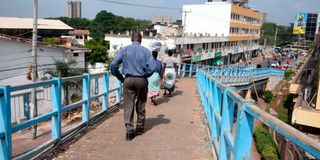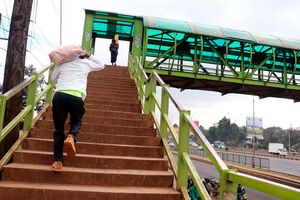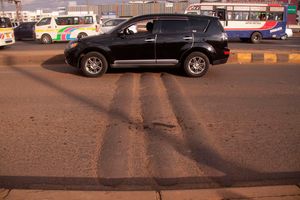
A footbridge at Shimanzi area near Makupa Bridge in Nyali, Mombasa County, on February 20, 2025.
Multi-million-shilling footbridges built in Changamwe, Shimanzi, Buxton and Kongowea in Mombasa County are wasting away after street families turned them into their playground.
They are now a haven for the homeless, muggers, beggars and hawkers selling merchandise. Additionally, they are smelly as they've been turned into toilets by night.
Many residents would rather take their chances crossing the road below, avoiding footbridges constructed by the national and county governments to reduce accidents and improve pedestrian safety.
Now, it appears that the millions of shillings pumped into building them may have gone to waste as they're no longer being used for their intended purpose.
For instance, the Buxton footbridge, launched by President Uhuru Kenyatta on January 5, 2017, was built at an estimated cost of Sh600 million. While commissioning it, the former president said the project would ensure safety of Mombasa's pedestrians.
Fast forward to 2025 and the facility is not in use. At least not by pedestrians.
“We no longer use it because they (street dwellers) have taken over the place, and it’s not safe. I know it’s dangerous to cross the road but I would rather risk my life than use the footbridge and be mugged,” said Jamilla Athman, a Buxton resident.

A footbridge at at Buxton, Mombasa County.
'I come here to unwind'
At the Kengeleni Flyover, residents told Nation.Africa that the structure is now a home to many.
“During the day, people come here to rest. Traders are also selling their merchandise. But at night, it’s a lodging,” said Prince Rondu.
The graduate, who's currently unemployed, says he has nowhere to go and spends his days at the flyover.
“I come here to unwind. I have nothing to do,” adds Mr Rondu.

A footbridge at Kengeleni, Mombasa County.
Frank Oduor, another local, urged the county government to deploy an inspectorate team to enforce proper use of footbridges.
“Why allow flyovers to become toilets? This is also a security threat because the street people have taken over,” he said.
At the Bangladesh flyover, built by the Kenya National Highways Authority, guards have been stationed to ensure pedestrians use it instead of crossing the road.
Michael Oscar, a resident from Makande area, said school-going children also avoid using the flyovers because of safety fears.
Fewer accidents
Despite this, Coast Regional Traffic Commandant George Kashimiri credits footbridges for reducing accidents in Mombasa County.
He said authorities have been conducting road safety campaigns urging pedestrians to use the flyovers, adding that cases of pedestrians being knocked down have significantly reduced.
Mr Kashimiri notes that previously, pedestrians were hit every three days, especially at the Bangladesh and Makupa footbridges.
“We went to the Bangladesh footbridge, where we have witnessed many accidents, and created awareness about the importance of using the facility rather than crossing. But people want shortcuts, and the majority are drunkards who have poor or impaired judgment on road safety matters,” said Mr Kashimiri.
Separately, Mombasa County Transport Executive Dan Manyala reckons people shun the facilities for various reasons.
“It's worth noting that people tend to avoid using footbridges for several reasons, including convenience, time, accessibility, and cultural habits," said Mr Manyala.
He noted that if a footbridge is not conveniently located, people find it easier to cross the street, even if it means navigating fast-moving cars.
"Using a bridge may take more time, especially if it involves stairs or longer routes, leading people to prioritise speed over safety."
He added that the county is engaging national road agencies to either rehabilitate existing footbridges or hand them over to the county for rehabilitation and maintenance.






